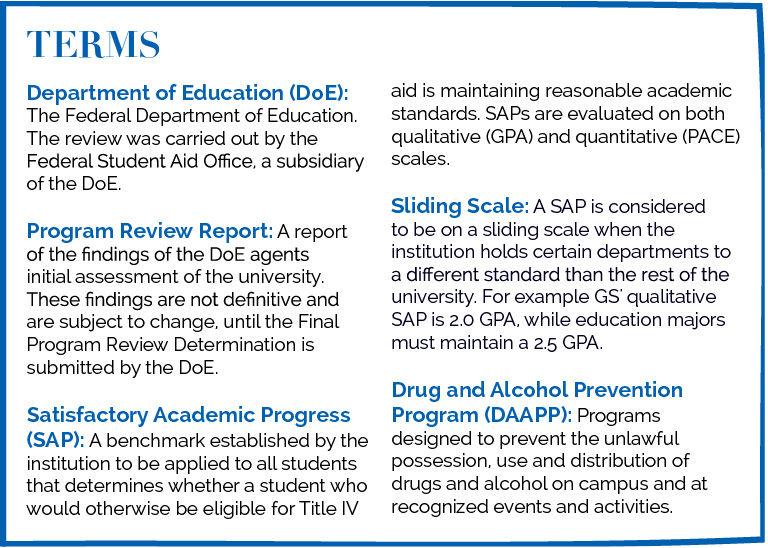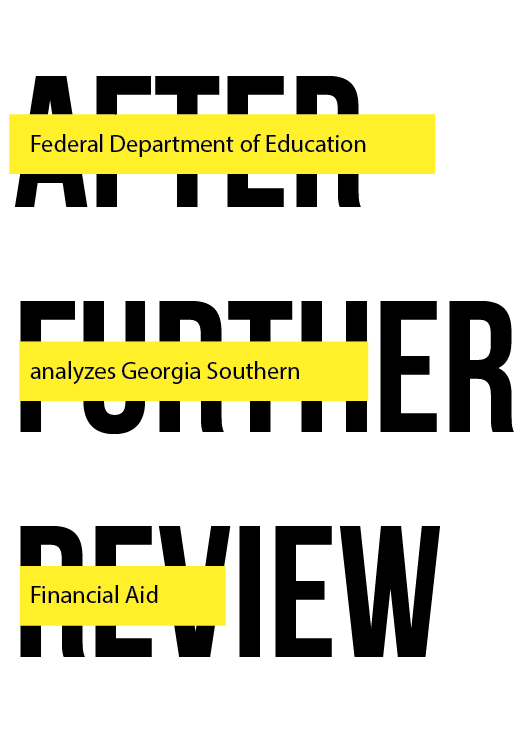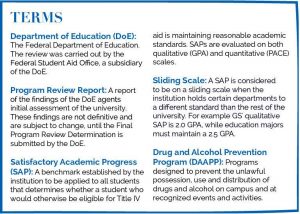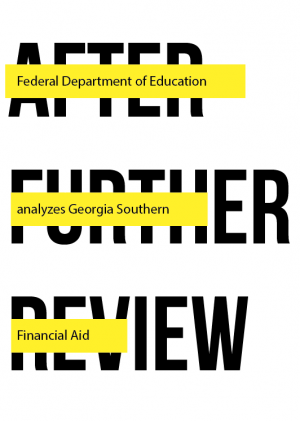GS faces federal Department of Education review
November 2, 2017
{{tncms-inline content=”<p><em>The entire Program Review Report submitted to Georgia Southern is available at the bottom of this article</em></p>” id=”aca937f2-1b7f-4c7a-9072-7073b6e812eb” style-type=”highlights” title=”Editor’s Note” type=”relcontent”}}
On Aug. 3, 2015 then interim president Jean Bartels, Ph.D., received a message from the Federal Student Aid Office, an office of the U.S. Department of Education (DoE), detailing an extensive review of Georgia Southern University’s use of Title IV funds.
Included with this letter was a 26-page preliminary program review of GS conducted by three DoE agents from May 11, 2015 to May 15, 2015, during which they found and documented 13 instances of noncompliance perpetrated by the university, according to documents obtained from the university through a Freedom of Information Act Request (FOIA).
In the 2016 fiscal year, eight universities in the state of Georgia received their final determinations from the same process, resulting in the collective return of over $7.3 million to the Federal DoE. The smallest fine issued was $109,460 to Life University in Marietta, Ga., while Atlanta Metropolitan State College in Atlanta, Ga. was told to return $2,675,375.89 in funds to the DoE. The following schools were also ultimately fined in their final determinations in fiscal year 2016:
- Life University – $109,460
- Abraham Baldwin Agricultural College – $194,632.01
- Gordon State College – $251,743
- South Georgia State College – $388,164.96
- Augusta University – $588,795.03
- Middle Georgia State University – $957,160
- Georgia Northwestern Technical College – $2,143,271
- Atlanta Metropolitan State College – $2,675,375.89
Although this process can seem daunting, it does not always necessarily result in large fines for the schools reviewed, and in some cases no fines at all. Savannah College of Art and Design received their final program review determination in September of 2015, and were found to have made satisfactory actions to correct their noncompliance citations, resulting in no fines being assessed.
The Initial Review
The topic was brought up at a faculty senate this past August, when a faculty member brought a question to the senate floor.
“Michelle Haberland said she had heard in a department meeting that [GS] had a problem related to Financial Aid that resulted in significant fines,” according to the senate minutes. “She asked President Hebert to clarify what was going on.”
To this inquiry President Hebert was noted saying that institutions throughout the nation were audited for Financial Aid purposes and asked Amy Ballagh. Ph.D., Interim Vice President of Student Affairs and Enrollment Management, to clarify the status of the audit. At the time of the senate meeting Haberland stated that the university had recently sent documents to the DoE and was awaiting a response.
When asked whether the DoE had responded since the time of that senate meeting Ballagh said they had not. They also are not currently aware of the status of the review.
“We don’t know at this time. We are waiting,” Ballagh said in an interview conducted this past October. “We have not yet received a final program review determination.”
The DoE has also elected not to comment on the current status of GS’ review.
“Consistent with regulation, the Department’s policy is not to comment on any ongoing program reviews at institutions – including whether one has commenced,” a DoE spokesperson said. “Once the review has concluded and a Final Program Review Determination issued to an institution, that package will be made publicly available on the [Federal Student Aid] Data Center.”
The initial program review report, submitted on Aug. 3, 2015, established eight findings that require action by the university:
-
Satisfactory Academic Progress (SAP) policy Inadequate
-
Drug and Alcohol Prevention Program Requirements Not Met
-
Failure to Perform Return of Title IV (RT2T4) for Unofficial Withdrawals
-
Entrance and Exit Counseling Not Conducted/Documented
-
Inaccurate and Late Enrollment Reporting to the NSLDS
-
Satisfactory Academic Progress Appeal Inadequate
-
Professional Judgment Not Documented
-
Ineligible Disbursement/Not Meeting Satisfactory Academic Progress
Some of these findings simply require the university to take specific actions, however some of these instances of noncompliance can result in fines being assessed to the university by the Department of Education.
Satisfactory Academic Progress
The first finding listed in the program review was concerning GS’ implementation of the Satisfactory Academic Progress (SAP) policy. SAPs are a benchmark established by the DoE to determine whether a student who would otherwise be eligible for Title IV aid is maintaining a reasonable academic career during their collegiate career.
SAPs are measured by two different factors. The student’s Quantitative (PACE) and Qualitative (GPA) progress. Quantitative is used to ensure that a student is completing their courses in a reasonable amount of time.
“All students will be evaluated at the end of each term to determine if they are making satisfactory pace of progression in their academic program,” according to the GS SAP policy. “PACE is calculated by dividing the cumulative number of hours the student has successfully completed (earned) by the cumulative number of hours the student has attempted.”
Students are encouraged to earn at least 67 percent of all attempted hours each academic year. Undergraduate students are expected to complete their degree program within a time equal to 150 percent of the published length of the program in credit hours. For example, the standard projected length of a degree that requires 126 credit hours is four years, and in order for a student to remain eligible to receive Title IV funds they must be on track to complete said program within 150 percent of that projection, six years.
Qualitative on the other hand, ensures that students who are receiving aid are maintaining a certain level of academic achievement. Students are evaluated at the end of each term, and are required to have at least a 2.0 GPA in order to remain eligible for Title IV aid according to the GS SAP policy. One key exception to this rule is the Education Department.
“The cumulative GPA required for Education Majors to maintain SAP at each evaluation is 2.50,” according to the GS SAP policy.
Education majors who do not have a 2.50 GPA at the time of SAP evaluation are not allowed to continue as education majors, however the GS academic policy allows these students to switch majors and can be eligible to qualify for Title IV at the next SAP evaluation if they meet their new majors benchmark, 2.0.
While the university is ultimately at liberty to decide what their SAP policy will be, to a certain degree, the DoE has strict policies concerning how these SAPs are maintained and enforced. At the time of GS’ initial review the DoE agent determined that GS’ implementation of the SAP policy was in violation of a number of DoE standards.
Noncompliance
GS was found to have been in violation of both qualitative and quantitative SAP evaluations, specifically three instances of noncompliance for each. Due to the sheer volume of documents, the full report is available at the bottom of this page.
GS was found to be incorrectly evaluating both SAPs at the end of each term, due to the fact that at the time the university evaluated SAPs at the end of the spring semester for all students, and the end of the summer term for students enrolled in summer courses.
“Because [GS] checks some students in the spring and some at the end of summer, a full time student who was checked in the previous spring and elected to enroll in the current summer term would exceed annual requirement when checked for SAP at the end of the summer term,” according to the review.
Another source of contention in the review was the way GS applies its qualitative SAPs. According to the review documentation, when an institution elects to hold a different standard for certain degree programs, it is considered a “sliding scale” SAP, which is the case for GS since education majors are required to maintain at least a 2.5 GPA, compared to the 2.0 GPA held by the rest of the university.
“[GS] does not use a sliding SAP scale,” according to the review. “However, concerning the latter case, [GS] does require its education majors to achieve a 2.5 cumulative GPA for purposes of graduation, which additionally requires the institution to maintain a separate SAP policy for these students, which it does not have and will be required to submit.”
Since the submission of the initial review report however, GS has updated its SAP policy accordingly.
{{tncms-inline content=”<p>&ldquo;[GS] is advised that these remedial measures cannot and do not diminish the seriousness of these violations nor do they eliminate the possibility that the [DoE] will impose an adverse administrative action and/or require additional corrective measures.&rdquo; – according to a Program Review Report</p>” id=”1bce94b8-577f-4a71-b25a-7f471fcf7d4b” style-type=”quote” title=”PullQuote” type=”relcontent”}}
Drug and Alcohol Prevention Program Requirements
Another finding reported by the DoE agents was the Drug and Alcohol Prevention Program Requirement.
“The Drug-Free Schools and Communities Act (DFSCA) and Part 86 of the [DoE’s] General Administrative Regulations require each institution of higher education (IHE) to certify that it has developed and implemented a drug and alcohol abuse prevention program (DAAPP),” according to the program review.
In addition to this, every IHE is required to conduct a biennial review to be submitted to the DoE in order to determine the effectiveness of its DAAPP.
Noncompliance
“[GS] violated the biennial review requirement of the DFSCA and the [DoE’s] Part 86 General Administrative Regulations. Specifically, it did not conduct a biennial review,” according to the review by DoE. “Such failures may contribute to increased drug and alcohol abuse as well as an increase in drug and alcohol-related violent crime at [GS].”
The review also stipulated that GS was required to immediately conduct a biennial review of its DAAPP, prepare a detailed report to be submitted to the DoE. It also indicated the seriousness of the violations.
“As noted above, the exceptions identified in this finding constitute serious violations of the DFSCA that by their nature cannot be cured,” according to the review. “[GS] is advised that these remedial measures cannot and do not diminish the seriousness of these violations nor do they eliminate the possibility that the [DoE] will impose an adverse administrative action and/or require additional corrective measures.”
Conclusion
It is important to note that the review is still under review and that findings are not definitive until the final review report is submitted by the DoE agents. Currently the university has not made any plans in place in the event that the DoE should hand down any fines, according to Ballagh.
As of the publication of this article the last correspondence between the university and the DoE is Oct. 23, 2017, according to documents obtained from the university through a FOIA request.
*Jozsef Papp also contributed to this article












